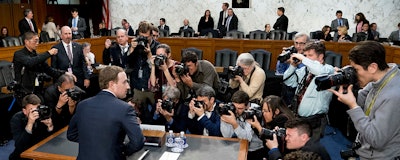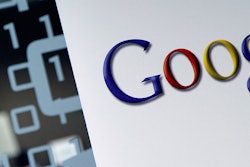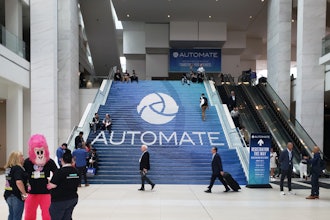
SAN FRANCISCO (AP) — Is Big Tech headed for a big breakup?
The U.S. Justice Department and the Federal Trade Commission are moving to investigate Google, Facebook, Amazon, and Apple over their aggressive business practices, and the House Judiciary Committee has announced an unprecedented antitrust probe, promising "a top-to-bottom review of the market power held by giant tech platforms."
In addition, at least two 2020 presidential hopefuls have expressed support for breaking up some of technology's biggest players amid concerns they have become too powerful.
Experts say breakups are unlikely in the short term, and Rep. David Cicilline, the Rhode Island Democrat who leads the subcommittee pursuing the House investigation, called such measures a "last resort." But even without that, Facebook, Google, Amazon, and Apple could face new restrictions on their power.
Google, Facebook, Amazon, and Apple declined to comment on the investigations.
Here's a look at the cases that could be brought against them and what their defenses could be.
With 2.4 billion users, $56 billion in revenue last year and a name that's synonymous with social media, Facebook is certainly big. But is it an illegal, competition-crushing monopoly?
Federal regulators are already investigating the company's privacy practices. But the antitrust question has been rumbling in the background, with critics calling for spinning off WhatsApp and Instagram. Democratic presidential candidate Elizabeth Warren has called for breaking up Big Tech, as has Chris Hughes, a co-founder of Facebook. Former Vice President Joe Biden has said that he is open to the idea.
Critics believe a breakup is needed because Facebook can squash competitors either by buying them or using its enormous resources to mimic services they offer — as it's done with Snapchat, for example.
Facebook executives have been calling broadly for regulation, though nothing that comes close to breaking it up. In a recent statement, the company's vice president of global affairs, Nick Clegg, said Facebook "accepts that with success comes accountability. But you don't enforce accountability by calling for the breakup of a successful American company." CEO Mark Zuckerberg has called for "new rules" in four areas: harmful content, election integrity, privacy, and data portability.
Facebook has also stressed that it has competitors in messaging and digital communication, including Apple and Google.
New York University law professor Eleanor Fox said that because antitrust law focuses on companies that raise prices too much, and Facebook is free, it will be a tough to break up the business. And Facebook commands less than a quarter of worldwide digital advertising, well behind Google.
Warren, however, has laid out plans for legislation that targets companies with more than $25 billion of annual revenue. It would limit their ability to expand and force parts of their business to operate as separate entities.
As Google becomes a leading mail provider, search engine and advertising platform, federal regulators are starting to wonder if it needs to be knocked down a bit.
Critics say Google's dominance in search has allowed it to squash rivals — notably because Google can show its own products above competitors' or feature its own ads prominently.
Google might argue it doesn't have an obligation to do business with its rivals at all — an argument that other companies have made when faced with similar challenges, said Sandeep Vaheesan, legal director for Open Markets Institute, which advocates breaking up monopolies.
It's Google's technology and Google can use it as it wishes, goes one line of reasoning.
Google has also faced scrutiny over the practices it uses to get its search and other products featured on smartphones. Some say Google imposes too many self-serving regulations on smartphone makers who use Google's Android operating system.
But Google might simply argue that Android users like Google products and want them on their phones.
Under existing laws, it is difficult to make the case that Google has monopoly power, "even though I think a lot of people think it's really obvious," Fox said.
APPLE
Since its opening in 2008, Apple's pioneering app store has given customers instant access to services that entertain, enlighten and engage. But it's also a place where Apple controls all the access and sets commission rates for subscriptions and other purchases made through the apps.
If it opens an investigation, the Justice Department is most likely to focus on whether Apple is abusing its veto and pricing power to throttle and gouge its competition. The commissions it collects are also the subject of a consumer lawsuit that the Supreme Court recently cleared to proceed.
App makers periodically allege that they are blocked because Apple wants people to use its own services. In a recent example, several makers of apps for managing the amount of time kids can use their iPhones say they were kicked out of the store not long after Apple introduced its own screen-management controls.
Apple says it typically blocks only apps with buggy software or features that invade users' privacy. The company likens its rules to merchants deciding what products to carry. Apple also says its store includes apps that compete with its own products, including Google Maps and Google's Chrome browser.
Also under criticism is the 30 percent cut that Apple pockets on new subscription sign-ups during the first year and a 15 percent slice for renewals. The app store is expected to generate about $16 billion in revenue this year.
Apple says the commissions cover costs for running the app store, including hiring people to review apps.
Antitrust regulators could try to impose requirements that lower Apple's commissions or, in a worst-case scenario, force it to spin off the app store. The latter option, though, could hurt consumers by making iPhones and other Apple products more cumbersome to use.
Wedbush Securities analyst Daniel Ives likened a breakup to "a complex and almost impossible Siamese twin operation."
AMAZON
From an online bookseller, Amazon has grown into a gigantic e-commerce player with its tentacles in everything from web hosting to streaming video to groceries.
The European Union's antitrust chief has been conducting an early-stage probe into whether Amazon is using data to gain an edge on third-party merchants, who are both its customers and rivals. Italy has been looking into whether Amazon abused its dominance by offering preferential treatment to companies that used Amazon's own delivery-management services.
Cicilline, the congressman, said Amazon has identified bestselling products elsewhere, rolled out replicas under its own brand and then steered customers to its own products over those of its rivals.
When Warren tweeted in April that big tech companies like Amazon should be broken up, Amazon tweeted back: "Walmart is much larger."
Amazon CEO and founder Jeff Bezos made a similar case in a recent letter to shareholders: "Amazon today remains a small player in global retail. We represent a low single-digit percentage of the retail market, and there are much larger retailers in every country where we operate. And that's largely because nearly 90 percent of retail remains offline, in brick and mortar stores."
But Amazon does dominate online. Market research company eMarketer expects Amazon to account for 52 percent of all online sales in the U.S. this year, up from 48 percent last year.
_____
Associated Press writers Mae Anderson in New York; Michael Liedtke in Cupertino, California; Matt O'Brien in Providence, Rhode Island; and Joseph Pisani in Las Vegas contributed to this story.






















